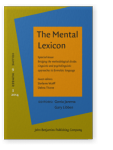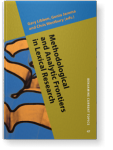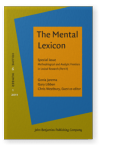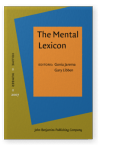Cyrus Shaoul
List of John Benjamins publications for which Cyrus Shaoul plays a role.
2014 N-gram probability effects in a cloze task Bridging the Methodological Divide: Linguistic and psycholinguistic approaches to formulaic language, Wulff, Stefanie and Debra Titone (eds.), pp. 437–472 | Article
What knowledge influences our choice of words when we write or speak? Predicting which word a person will produce next is not easy, even when the linguistic context is known. One task that has been used to assess context dependent word choice is the fill-in-the-blank task, also called the cloze… read more
2012 Formulaic sequences: Do they exist and do they matter? Methodological and Analytic Frontiers in Lexical Research, Libben, Gary, Gonia Jarema and Chris Westbury (eds.), pp. 369–393 | Article
There is a new and growing interest in psycholinguistics in the mental representation of (not necessarily phrasal) multi-word sequences and in how knowledge of these sequences relates to word, phrase, and sentence knowledge. In this paper we summarize the evidence for the existence of distinct… read more
2011 Formulaic sequences: Do they exist and do they matter? Methodological and Analytic Frontiers in Lexical Research (Part II), Jarema, Gonia, Gary Libben and Chris Westbury (eds.), pp. 171–196 | Article
There is a new and growing interest in psycholinguistics in the mental representation of (not necessarily phrasal) multi-word sequences and in how knowledge of these sequences relates to word, phrase, and sentence knowledge. In this paper we summarize the evidence for the existence of distinct… read more
2007 LINGUA: The Language-Independent Neighbourhood Generator of the University of Alberta The Mental Lexicon 2:2, pp. 271–284 | Article
LINGUA (Language-Independent Neighbourhood Generator of the University of Alberta) is a free, platform-independent (Java) program consisting of a set of tools that have been developed for three purposes: to turn corpora into frequency dictionaries; to calculate orthographic neighbourhood and N-gram… read more



